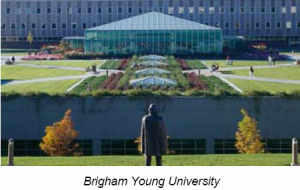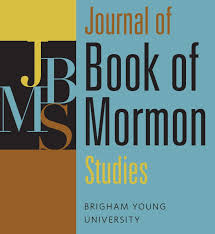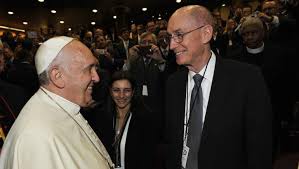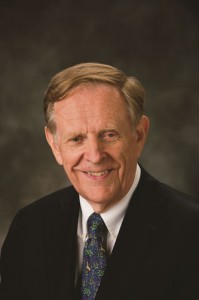[A continuation of my earlier reflections on BYU, in response to Professor Richard Bushman]
But to return to the specific situation at BYU: I spoke of challenges and warned of tendencies, he sees “battle lines.” I discern differing (and, it is true, ultimately incompatible) visions among faithful and well-intentioned colleagues (at an institution where, as I write, “the broad and deep religious commitment of students and faculty is by far the greatest asset the university possesses”), he somehow hears a reference to nothing less than “benighted aliens.” (?!) I do not draw any stark moral dichotomy; rather I maintain the view that, as a wise man once said, the line between good and evil runs right through every human heart. Thus I spoke of a “mainstream strategy, which has so far served us well,” a certain compromise of “bilingualism” that I fear has run its course, and I clearly noted the difficulty of interpreting and applying prophetic counsel that we adopt “gospel methodology, concepts and insights” and to avoid “pernicious, atheistic influences.” (Any quarrels with this dichotomy should thus be referred to President Kimball, and not to me.) Prof. Bushman simplifies the challenge I describe in order to dismiss it as based on “the axis of religion against the world.” To be sure, I intend in my article to present the reader (especially the BYU reader) with a challenging alternative –but it cannot be simply reduced to the religion / world dichotomy. Before dismissing me for dismissing “some of our fellow saints,” and judging me wanting in “compassion and good will,” it might be useful to attend to my actual argument.
Prof. Bushman finds is ready to judge me too focused on “the Glory of God” (not that there’s anything wrong with that), but in fact I did not frame the argument in this way but rather quoted Jeffrey R. Holland’s invitation to “sort, sift, prioritize, [and] integrate,” and worried about the usually implicit but powerful alliance between “reductionist scientism and an ethic of limitless personal freedom.” My concern in fact was and remains first and foremost intellectual, since I trust the religious benefits to follow from the most venturesome thinking (thinking not limited to reductionist specialization). In a word, my argument is not for some holy campaign, as Bushman suggests, but for a good ole liberal arts education as most conducive to the full exercise of divine intelligence.
The risks inherent in assuming a dichotomy between the human and the divine and thus skipping the question of the good are apparent, I think, in Prof. Bushman’s reference to the question of homosexuality: “Compassion for the position of gays in modern society is as genuinely Mormon (and Christian) as is the defense of the family.” But this assumes that “compassion” is automatically identical with Christian charity, or that one can truly care for a person without knowing who a person truly is, and thus what is truly good for a being created in God’s image. Prof. Bushman reads lack of “compassion” into my sympathy with the Church’s defense of real marriage. But is it not possible that a “defense of the family,” properly understood, would be essential to informing our charity with regard to self-identified “gays”? But readers of First Things (and notably of Michael Hannon’s article in the March issue) will not need any further explanation of this point.
Prof. Bushman’s sensitivity to “battles lines … along the axis of religion against the world” is understandable in light of his own experience as an LDS historian of LDS things. To his very great credit, he learned the hard way of “an epistemological gap [that] yawns between my view of the Prophet [Joseph Smith] and that of most academics. Believing Mormons stand on the other side of a gulf separating us from most educated people.” (On the Road with Joseph Smith) We are forever in his debt for a magisterial study of Joseph Smith (Rough Stone Rolling) that combines uncompromising historical candor with an undisguised admiration for the complicated man he and I revere as a prophet. Brother Bushman and I are both believing Latter-day Saints, and this is ultimately far more important than our differences. But our differences matter for the future of LDS education. If he is right that such an “epistemology gap” necessarily exists, then wouldn’t any real, serious “compassion and good will” require that we take seriously the institutional challenge presented by this gap?
In fact my view of the “epistemological gap” is a little more complicated than Prof. Bushman’s. I am worried about an “epistemological gap” opening up among Mormons, even or especially in the very minds of perfectly sincere and “active” Mormons. The “gap” between reason and revelation masks a less obvious but potentially more powerful gap within our very understanding of reason. Is reason reducible to constructivist science, or must ethically informed reason guide science? Before we can ask secular scholars to believe that the Father and the Son appeared to Joseph Smith (or at least to respect those who believe this), we might ask them rationally to scrutinize their own faith that technological reason can adequately guide us as individuals and as a political community. Richard Bushman’s construction of “battle lines” between “religion” and “the world” presupposes a certain constricted understanding of reason that ought to be questioned from both directions — that’s really the sum and substance of my analysis of and of my hope for BYU. Does this imply “contending parties”? Well, I certainly portray a question with high stakes. Does Prof. Bushman believe that it is better to preserve the appearance of comity by not asking this question? Or does he simply perceive me to be on wrong side of the battle as he construes it – and thus perhaps as a “benighted alien”!
Until the Distinguished Professor actually engages the questions I have raised, we will have no way of knowing.












